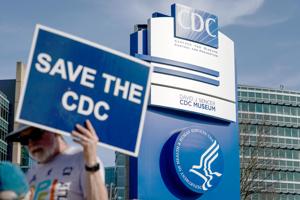
News
September 04, 2025
Commentary: The CDC is under siege. The poor will pay the price
The recent ouster of Centers for Disease Control and Prevention Director Susan Monarez and the resignations of top officials mark not just an institutional crisis but the latest chapter in a political war on evidence-based public health. This purge is...
The recent upheaval at the Centers for Disease Control and Prevention (CDC), marked by the departure of Director Susan Monarez and several other high-ranking officials, has sent ripples of concern throughout the public health community. Experts warn that these changes are more than just internal restructuring; they represent a politically motivated attack on science-based public health practices, and ultimately, it will be the most vulnerable populations who bear the brunt of the consequences.
The CDC, long considered a global leader in disease prevention and health promotion, is now facing what many are calling an institutional crisis. The sudden removal of key figures, individuals deeply experienced in navigating complex public health challenges, suggests a deliberate effort to undermine the agency's autonomy and scientific integrity. Critics argue this is part of a broader pattern of prioritizing political agendas over evidence-based decision-making.
The implications of this "purge," as some insiders are calling it, are far-reaching. When public health policies are dictated by politics rather than scientific data, the effectiveness of programs designed to protect communities is compromised. This can lead to a resurgence of preventable diseases, increased healthcare costs, and a weakening of the nation's ability to respond to public health emergencies.
Historically, marginalized communities already face significant barriers to accessing quality healthcare and are disproportionately affected by public health crises. Factors like poverty, lack of access to nutritious food, and inadequate housing contribute to higher rates of chronic diseases and increased vulnerability to infectious diseases. When the CDC's ability to address these disparities is hampered, these vulnerable populations are left even further behind.
The fear is that without strong, independent leadership guided by scientific evidence, the CDC will struggle to effectively address critical public health issues such as emerging infectious diseases, the opioid crisis, and chronic health conditions that disproportionately impact low-income communities. The long-term consequences of this political interference could be devastating, not only for the CDC's standing as a trusted public health authority but also for the health and well-being of the nation, particularly its most vulnerable citizens. The future of public health, and the well-being of those most in need, hangs in the balance.
The CDC, long considered a global leader in disease prevention and health promotion, is now facing what many are calling an institutional crisis. The sudden removal of key figures, individuals deeply experienced in navigating complex public health challenges, suggests a deliberate effort to undermine the agency's autonomy and scientific integrity. Critics argue this is part of a broader pattern of prioritizing political agendas over evidence-based decision-making.
The implications of this "purge," as some insiders are calling it, are far-reaching. When public health policies are dictated by politics rather than scientific data, the effectiveness of programs designed to protect communities is compromised. This can lead to a resurgence of preventable diseases, increased healthcare costs, and a weakening of the nation's ability to respond to public health emergencies.
Historically, marginalized communities already face significant barriers to accessing quality healthcare and are disproportionately affected by public health crises. Factors like poverty, lack of access to nutritious food, and inadequate housing contribute to higher rates of chronic diseases and increased vulnerability to infectious diseases. When the CDC's ability to address these disparities is hampered, these vulnerable populations are left even further behind.
The fear is that without strong, independent leadership guided by scientific evidence, the CDC will struggle to effectively address critical public health issues such as emerging infectious diseases, the opioid crisis, and chronic health conditions that disproportionately impact low-income communities. The long-term consequences of this political interference could be devastating, not only for the CDC's standing as a trusted public health authority but also for the health and well-being of the nation, particularly its most vulnerable citizens. The future of public health, and the well-being of those most in need, hangs in the balance.
Category:
Politics